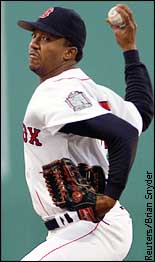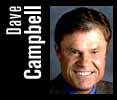| | Pedro or Pudge?
This is just a continuing debate on whether a pitcher can win the MVP Award. For many years, the MVP was the only postseason award. When the Cy Young Award came aboard in 1956, it was voted on for the best pitcher in baseball, regardless of the league. Later, they made a Cy Young Award for both leagues.
|  | | Pedro Martinez allowed more than three runs just twice in 29 starts in 1999. |
I guess my gut feeling is that if this controversy arises again, we may have to add an additional award, one for most valuable position player. We have the Hank Aaron Award for best hitter, but we may need something that will be as presitigious as the Cy Young Award. That way, the Most Valuable Player Award can go to the best pitcher or the best position player. But the key is to have the award for the position player as presitigious as the Cy Young, which is the pinnacle for a pitcher.
Who should have won? When I was watching the SportsCenter piece on Pedro this morning, my thoughts were that when this guy pitched, he gave his team a better chance of winning than any player in baseball today. And that showed up in his win-loss record, which was 23-4. He really only got knocked around once all year, when Florida scored nine runs off him right after the All-Star Game. Other than that, he gave up more than three runs only one other time. One of his losses was to Tampa Bay, when Dave Eiland beat him 3-2, which has to rank as one of the biggest upsets of the year.
As a single player, I think he was the most valuable to his team. Pudge had a terrific season. The only downside was his grounding into double plays (32). But I would have voted Pedro the most valuable.
Pudge excels in Texas heat
You know, when you're a player in the big leagues, you don't think pitchers are as valuable as everyday players. I always wondered why pitchers were making so much money because they were only playing every fifth day. But then you realize pitching is the single most important element of winning. If you have good pitching, you always have a chance to win the game. Just look at teams like the Mariners or Rockies, who have scored lots of runs in recent years but had terrible pitching.
|
Pitcher vs. hitter
|
|
Since 1971, only one starting pitcher has won the MVP Award (Roger Clemens in 1986). Here are some case studies:
Randy Johnson, 1995: Ken Griffey Jr. spent much of the year on the DL, but the Big Unit went 18-2 and led the AL in ERA and K's. He also beat the Angels in the division tiebreaker. He finished sixth in the MVP vote as Mo Vaughn (39-126-.300) won.
Greg Maddux, 1995: Maddux went 19-2 with a 1.63 ERA in the strike-shortened season, yet finished third behind Barry Larkin (15-66-.319) and Dante Bichette (40-128-.340).
Orel Hershiser, 1988: Hershiser went 23-8 with a 2.26 ERA and pitched 59 scoreless innings in August and September. He finished only sixth, as teammate Kirk Gibson (25-76-.290) won.
Roger Clemens, 1986: Clemens (24-4, 2.48) and the Red Sox beat out Don Mattingly (31-113-.352) and the Yanks for the AL East title and Clemens beat Mattingly for MVP.
Dwight Gooden, 1985: Gooden went 24-4 with a 1.53 ERA but finished fourth in the MVP vote. Willie McGee (10-82-.353) of the first-place Cardinals took home the trophy.
Ron Guidry, 1978: Guidry was 25-3 with a 1.74 ERA. Jim Rice went 46-139-.315. The Yankees won the division but this time the hitter won the award.
Steve Carlton, 1972: Pitching for the last-place Phillies, Carlton went 27-10 with a 1.98 ERA. The rest of the team won just 32 games. Johnny Bench hit 40-125-.270 and won the MVP. Carlton was fifth.
Vida Blue, 1971: Blue went 24-8, 1.82 to win MVP honors. Teammate Sal Bando (24-94-.271) was second.
Tom Seaver, 1969: Seaver (25-7, 2.21) led the Miracle Mets to the NL title, but finished a close second behind Willie McCovey (45-126-.320) for MVP.
Bob Gibson, 1968: The last NL starter to win the award, Gibson went 22-9 with a 1.12 ERA. Pete Rose (16-82-.348) finished second.
Sandy Koufax, 1966: In his final season, Koufax went 27-9, 1.73, but lost out by eight points to Roberto Clemente (29-119-.317) for MVP.
|
I think Pudge was probably the most valuable position player in the league this year. Aside from holding his own as a hitter, he plays the most demanding position in baseball and has to play half the season in the 100-degree heat in Texas, which is probably the toughest place to play in baseball. He caught more games and innings than any catcher in the American League. Along with his great offensive numbers, he threw out nearly 55 percent of baserunners.
Another key to his defense is his great ability to pick runners off base. With shorter leads, runners can't score as easily from first on a double and the team turns more double plays. I know when I played I was a fairly aggressive runner, but when Johnny Bench and Steve Yeager were behind the plate, I was afraid if I blinked I would be picked off. As to whether Rodriguez calls a good game, I couldn't really say. You'd have to have a lot of input from pitchers and see him play every day to know. But from a purely mechanical point of release, arm strength and receiving pitches, he's the best there is. Compared to Bench, from my standpoint on pure arm strength, it would be fractionally given to Bench. But when considering release and accuracy, Pudge may have the slight edge.
Unhittable Pedro
One more thing on Pedro, which I really started thinking about after a discussion with Mike Shannon, the former Cardinals player and now a broadcaster. I signed professionally in 1964, and have watched on TV or played against or seen as a broadcaster all the great pitchers and Hall of Famers since then -- Seaver, Gibson, Ryan, Carlton, Sutton, Jenkins, Perry, Marichal. To me, of all the pitchers I faced or watched a considerable amount, Pedro Martinez is the toughest guy to hit.
He has three absolutely superior pitches. He throws a 95-mph fastball. Now, a lot of guys can throw 95 mph, but Martinez has a 77-mph changeup. The only other pitcher in baseball with a pitch like that is Trevor Hoffman and his fastball is 92 mph. But you throw in that breaking ball of Pedro's that just sits up there and goes in another direction, and he's impossible to hit at times.
I don't think any of the other greats had three outstanding pitches. Seaver had a great fastball and a great slider. Gibson was a fastball/slider pitcher. Ryan had a fastball and a curve; he never really mastered an offspeed pitch. Randy Johnson is fastball/slider. Orel Hershiser dominated with two pitches in 1988 -- a fastball and the hard sinker. The thing that is so frightening about Pedro is he has the ability to make you look stupid at the plate.
I wouldn't know how to figure out a gameplan against him. Against Ryan, whom I faced early in his career, I said if he can throw me three breaking balls for strikes, I wouldn't get the bat off my shoulder. Against Seaver, if he threw me three sliders for strikes, I knew I was done. I couldn't hit a slider, so I just sat fastball. But with Pedro, you may not see a fastball the entire at-bat.
I've seen the best hitters in the game just look foolish against him. Charley Steiner and I did a game in Boston this year where he struck out 15 Mariners. He got Griffey the first three times up and Griffey had no chance. He kept throwing him cut fastballs, trying to keep the ball out of his kitchen. Then he would throw the changeup and there's no way you can hit it. He's the best pitcher I've seen in the last 35 years.
ESPN's Dave Campbell played eight seasons in the big leagues. Campbell's Corner will appear periodically during the offseason.
| |
ALSO SEE
Ivan the Terrific edges Martinez for AL MVP
Outrage in Boston, but Pedro OK with vote
Stats Class: Martinez vs. the Greats

|



